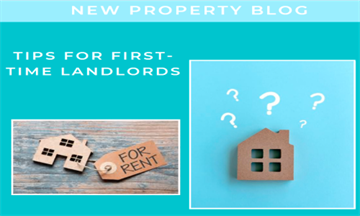Are you thinking of becoming a first-time landlord? There are things to consider, so here are our tips to help prepare your home.Safety You will need to secure the property and make it safe for your tenants. You may want to look at installing a ...
Are you thinking of becoming a first-time landlord? There are things to consider, so here are our tips to help prepare your home.
Safety
You will need to secure the property and make it safe for your tenants. You may want to look at installing a security system. Check that all external locks and windows are in full working order, and ensure any security problems are resolved before your tenants move in.
Insurance
It’s important to make sure any insurance policies are in place beforehand. So, you get the correct cover, you need to make your insurers aware that you plan to let the property, so you get the right cover.
Furnished/unfurnished
As a rule, the higher the rent, you’ll find it’s likely your tenants will want to furnish the property themselves as they’ll have a higher income. If you let your property unfurnished, it’s one less thing to think about. A furnished property needs necessary furnishings in place prior to tenants moving in. The benefit of an unfurnished property is that you don’t need to budget for maintenance or replacements or book annual testing of electrical appliances.
Décor
Regardless of whether a home is furnished or unfurnished, it should be well decorated and well-presented. This should increase the demand and will potentially allow you to charge a premium. You should also choose a neutral décor that will appeal to the masses as opposed to quirky, colourful interiors. Think about any restrictions you’d like to put in place when allowing tenants to decorate, such as nails in the walls.
Managed or not
Are you thinking of taking on the responsibility of managing the property yourself or will you pay a letting agent to do it? As it’s your first time letting a property, having an agent manage the property for you should ensure everything is in order and help to form good communication with your tenants. They’ll also be available to advise on best practices and if you have any issues, they’ll be able to make sure it’s taken care of quickly and in a professional manner.
Inventory
You’ll want to do a thorough inventory, outlining the condition of the property before the tenants moved in, along with everything included in the home. This will ensure it’s all accounted for when the tenant moves out and help assess any damage.
Cleaning
Always make sure the property is let in a clean condition. Consider hiring a professional cleaning service.
Garden
If the property has outdoor space, ensure it’s also in good condition prior to the tenant moving in. Think about who will be responsible for maintaining the space and whether or not tenants will be allowed to plant flowers, etc. in the garden.
Deposit
Ensure the deposit on the property is paid prior to the tenant moving in, it should be held via a deposit protection scheme and will be held until the contract ends. If the property is left in good condition, the full deposit will be returned once they vacate. However, if there is damage or items are missing, or additional cleaning is needed, you can deduct it from the deposit.
Bills
Most lets don’t include bills; however, some do. Will you include bills or not? Think about it before finalising a tenancy agreement.
Keys
Finally, it’s advisable to always have one spare set of keys available for yourself in case there’s an emergency.
We hope our blog has given you some basic first-time landlord tips.
If you're looking to become a first-time landlord and need advice, contact our award-winning team here.






Share this with
Email
Facebook
Messenger
Twitter
Pinterest
LinkedIn
Copy this link